

10 Lines on Mahatma Gandhi
Mahatma Gandhi was the greatest leader of his time and millions of people used to respect and follow him. He completely changed his attire and wore a simple loincloth, which, he thought, would let him connect to the Indian poor. He took an active part in the Indian Independence Movement and led India to the path of Independence through truth and righteousness.
Ten Lines on Mahatma Gandhi in English
I have provided here 10 lines, 5 lines, 20 lines, a few lines, and sentences on Mahatma Gandhi for my dear children and students of Classes 1, 2, 3, 4, 5, and 6. Just go through these lines to find the best one for you:
1) Mahatma Gandhi had born in a Hindu family on 2nd October 1869 at Porbandar in Gujarat.
2) His father Karamchand Uttamchand Gandhi was Diwan of Porbandar.
3) Mahatma Gandhi married Kasturbai Makhanji Kapadia in May 1883.
4) On 4th September 1888, he left for London for higher studies.
5) He was a civil right activist in South Africa from 1893 to 1914, fighting against color discrimination.
6) He returned to India in 1915 and joined the Indian National Congress.
7) Gandhi ji started the first movement against British rule, Champaran Satyagraha in 1917.
8) He launched the non-cooperation movement on 01 August 1920 after Jallianwala Bagh Massacre.
9) He started Salt/Dandi March on 12th March 1930 and continued till 06th April 1930.
10) Nathuram Godse, a right-wing advocate of Hindu Nationalism, assassinated Gandhi on 30th January 1948 at Birla House, New Delhi.
10 Lines and Sentences on Mahatma Gandhi
1) Mahatma Gandhi was the leader of the Indian Independence Movement against British rule.
2) He inspired civil rights and freedom movements across the world.
3) The title “Mahatma” was given to him in South Africa in 1914.
4) In India, Mahatma Gandhi was fondly called Bapu and Gandhi Ji.
5) Mahatma Gandhi belonged to a merchant caste family from coastal Gujarat in India.
6) He returned to India in 1915 and started mobilizing farmers against excessive taxes.
7) He was imprisoned on several occasions for many years in South Africa and India.
8) Mahatma Gandhi wore simple yarn clothes woven with yarn hand-spun on a charkha.
9) He was strict a vegetarian and undertook fasts for protests and self-purification.
10) Mahatma Gandhi undertook his last fast on 12th January 1948 at the age of 78.
5 Lines on Mahatma Gandhi
1) Mahatma Gandhi was a great Indian freedom fighter.
2) He started many freedom movements in India.
3) He was a supporter of Ahinsa (non-violence).
4) He is also renowned as the “Father of the Nation”.
5) Today also, people follow his teachings and beliefs.
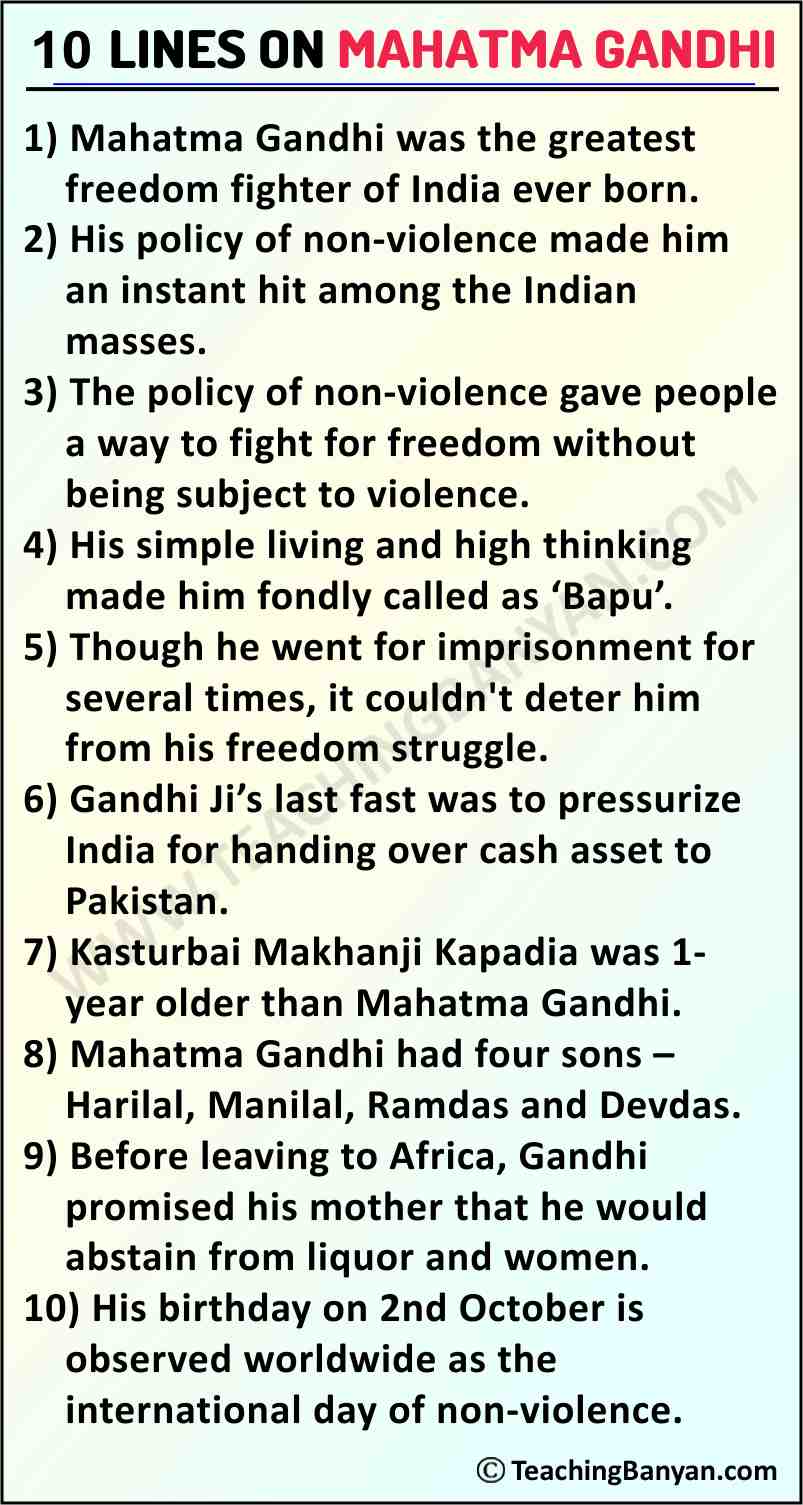
20 Lines on Mahatma Gandhi
1) He was a great follower of truth and non-violence and supported them throughout his life.
2) Mohandas Karamchand Gandhi was an Indian lawyer, active politician, and freedom fighter.
3) The main campaign run by Gandhi Ji during freedom struggles are Champaran Satyagraha, Kheda Satyagraha, Non-cooperation Movement, Salt Satyagraha, etc.
4) Gandhi Ji pursued his degree in law from London University.
5) Mahatma Gandhi joined the Indian National Congress in 1920.
6) Despite being nominated 5 times, Gandhi Ji had never won the Nobel (Peace) Prize.
7) Gandhi Ji was the winner of the ‘ Time Magazine of the Year ’ award in 1930.
8) Gandhi Ji had died at Gandhi Smriti formerly known as Birla House.
9) India celebrates his birthday as the Gandhi Jayanti every year.
10) The Indian Government has declared 30 January as Martyrs’ Day.
11) Mahatma Gandhi was the greatest freedom fighter of India ever born.
12) His policy of non-violence made him an instant hit among the Indian masses.
13) The policy of non-violence gave people a way to fight for freedom without being subject to violence.
14) His simple living and high thinking made him fondly called Bapu.
15) Though he went to imprisonment several times, it couldn’t deter him from his freedom struggle.
16) Gandhi Ji’s last fast was to pressurize India for handing over cash assets to Pakistan.
17) Kasturbai Makhanji Kapadia was 1-year older than Mahatma Gandhi.
18) Mahatma Gandhi had four sons – Harilal, Manilal, Ramdas, and Devdas.
19) Before leaving for Africa, Gandhi promised his mother that he would abstain from liquor and women.
20) His birthday on 2nd October is observed worldwide as the international day of non-violence.
Mahatma Gandhi had shown the path to millions towards independence and self-rule using policies of non-violence and civil disobedience. He was the greatest freedom fighter who proved to the world that the greatest of battles could be fought and won by applying peaceful methods. We all must take active participation in celebrating Gandhi Jayanti, commemorating the birth of India’s Greatest Leader and freedom fighter, and must remember his teachings and beliefs.
Related Information:
10 Lines on Gandhi Jayanti
10 Lines on Mahatma Gandhi’s Educational Philosophy
Related Posts
10 lines on patriotism, 10 lines on nationalism, 10 lines on national flag of india, 10 lines on importance of national flag, 10 lines on importance of national festivals of india, 10 lines on national festivals of india, 10 lines on national festivals celebration, 10 lines on a.p.j. abdul kalam, 10 lines on organ donation, leave a comment cancel reply.
Your email address will not be published. Required fields are marked *

Short Essay and 10 Lines on Mahatma Gandhi
Home / Blog / Short Essay and 10 Lines on Mahatma Gandhi
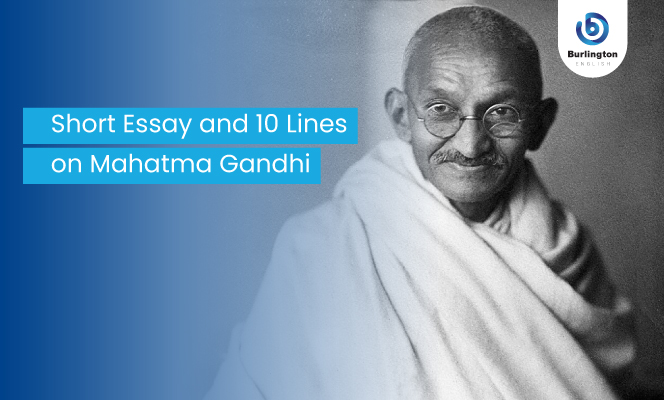
- October 1, 2024
The Life of Mahatma Gandhi – An Essay Writing Approach
As Gandhi Jayanti approaches, students anticipate yet another essay on the great philosopher and leader Mahatma Gandhi in school boards nationwide. However, writing biographical essays can be confusing, especially as learners are sometimes afraid of missing crucial events in the life of the grand figure. To make this Gandhi Jayanti easier for our young students, we have created a list of 10 lines about the Mahatma Gandhi’s life , followed by a sample essay. The pointers will serve as support for the students as they approach their essays:
10 lines about Mahatma Gandhi
- Mahatma Gandhi’s full name is Mohandas Karamchand Gandhi.
- He is recognised as India’s ‘Father of the Nation’.
- Mohandas Karamchand Gandhi was born in Porbandar, India, on 2 October 1869 to Karamchand Gandhi, a politician who was the Diwan of Porbandar, and Putlibai Gandhi, who significantly shaped Mahatma Gandhi’s values through her own belief in Jainism.
- He believed in living a simple life of truth, self-discipline and non-violence.
- Gandhi was also a supporter of empowerment through basic education, where students would learn through experiences.
- In 1915, the veteran Indian philosopher and writer Rabindranath Tagore honoured Gandhi with the title of ‘Mahatma’, recognising his determination to fight for India’s freedom through peaceful means using satyagraha and ahimsa .
- His philosophy of non-violence has inspired many people in India and abroad, including the global leader, Martin Luther King Jr.
- The ‘International Day of Non-violence’ marks his birthday every year.
- Gandhi led several major movements during India’s freedom struggle, such as The Salt March (1930) and the Quit India Movement (1942).
- He believed in self-reliance and encouraged the manufacturing and crafting of indigenous goods through the Swadeshi Movement as a means of rejecting British goods.
A Short Essay on Mahatma Gandhi
Mohandas Karamchand Gandhi, who would grow up to become Mahatma Gandhi, was born on October 2, 1869, in Porbandar, Gujarat. His father was Karamchand Gandhi, a political leader who worked as the Diwan or Chief minister of Porbandar. His mother, Putlibai Gandhi, was a simple religious woman who greatly influenced Mahatma Gandhi’s values and ideologies in life.
Gandhi is one of the most inspiring leaders in the world. With his principles of ahimsa and satyagraha , he played a significant role in India’s freedom struggle against the British. He inspired peaceful protests, aiming at change without violence and bloodshed.
Gandhi led the Salt March in 1930 and the Quit India Movement in 1942, encouraging millions of Indians to fight for their freedom. He led the path to simplicity, truth, and service to humanity and believed in the dignity of everyone, irrespective of their caste, creed, or religion. Gandhi also advocated for empowering individuals through basic education that emphasised experiential learning. In 1915, Rabindranath Tagore conferred upon him the title of ‘Mahatma’ for his persistent belief in truth and non-violence and his efforts to fight for India’s freedom by peaceful means.
Gandhi inspired not only Indians with his principles but also several global leaders in their fights for change. He has left behind a legacy of peace and non-violence that will continue to live till the time humanity exists.
Recent Posts

A Short Essay and 10 Lines on Christmas

How to Write an Application to the Principal? Format, Examples, Tips

A Short Essay and 10 Lines on Children’s Day

Articles in English Grammar: Use of A, An, The with Worksheet
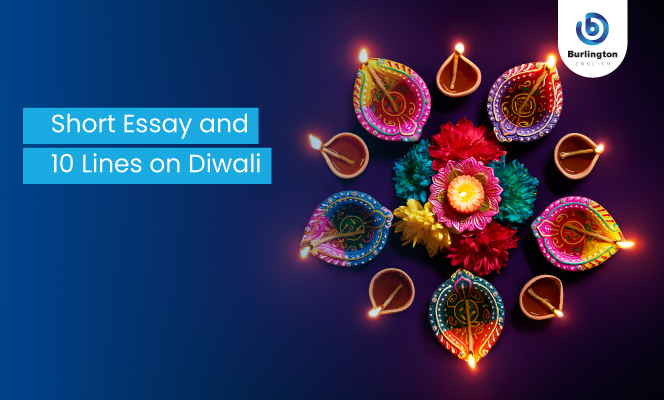
Short Essay and 10 Lines on Diwali – 2024

What Is Grammar?
- Learning English
- Uncategorized
Burlington English India Unit No. 103, Block – B, 1 st Floor, Unitech Business Park, South City -1, Sector 41, Gurugram – 122003 Haryana, India
- Technical Support
© 2023 Burlington India. All Rights Reserved.

10 Lines on Mahatma Gandhi in English [2025] – EnglishAspirants
10 Lines on Mahatma Gandhi in English: In this article, you are going to read 5 sets of 10 lines and 1 set of 5 lines on Mahatma Gandhi in English. These 10 lines will be helpful for kids as well as students of all classes (nursery, LKG, UKG, classes 1, 2, 3, 4, 5, 6, 7, 8, 9, 10, 11, and 12). So, let’s begin.
Table of Contents
10 lines on Mahatma Gandhi: Set 1
1. Mahatma Gandhi was a great freedom fighter and social activist.
2. His full name was Mohandas Karamchand Gandhi.
3. He was born on 2nd October 1869 in Porbandar, Gujarat.
4. His parents were Karamchand Gandhi and Putlibai.
5. At the age of thirteen, he was married to Kasturba Gandhi.
6. Gandhiji taught us the principles of Truth and Non-violence.
7. He led many movements like Non-cooperation movement, Dandi March, Quit India Movement, etc.
8. Due to his efforts India got independence from British rule in 1947.
9. He is called the ‘Father of the Nation’.
10. His birthday is celebrated as Gandhi Jayanti throughout India.
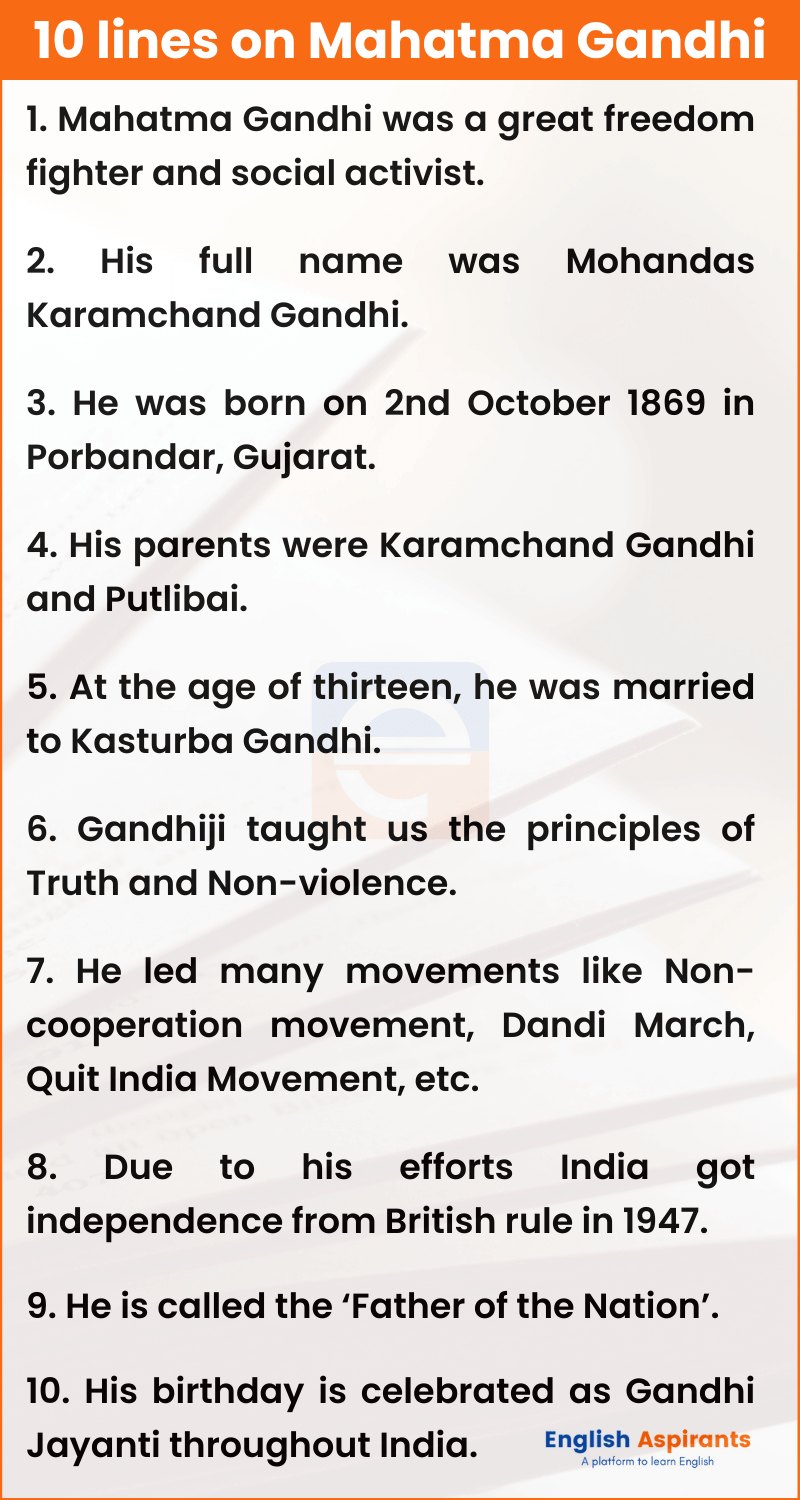
Also Read: Essay on Mahatma Gandhi
Mahatma Gandhi Essay in English 10 lines: Set 2
1. Mahatma Gandhi was a great Indian leader and freedom fighter.
2. He was born on 2 October 1869 in Porbandar, India.
3. His father was Karamchand Gandhi and his mother was Putlibai.
4. Gandhiji is the symbol of love, peace, honesty and truth.
5. He sacrificed his life for the sake of our freedom.
6. He used tools like satyagraha and non-violence to achieve his goal.
7. He led a simple and disciplined life.
8. People call him the ‘Father of the Nation’ for his contributions.
9. We celebrate his birthday as Gandhi Jayanti in India.
10. Gandhiji’s principles and dedication will continue to inspire the country.
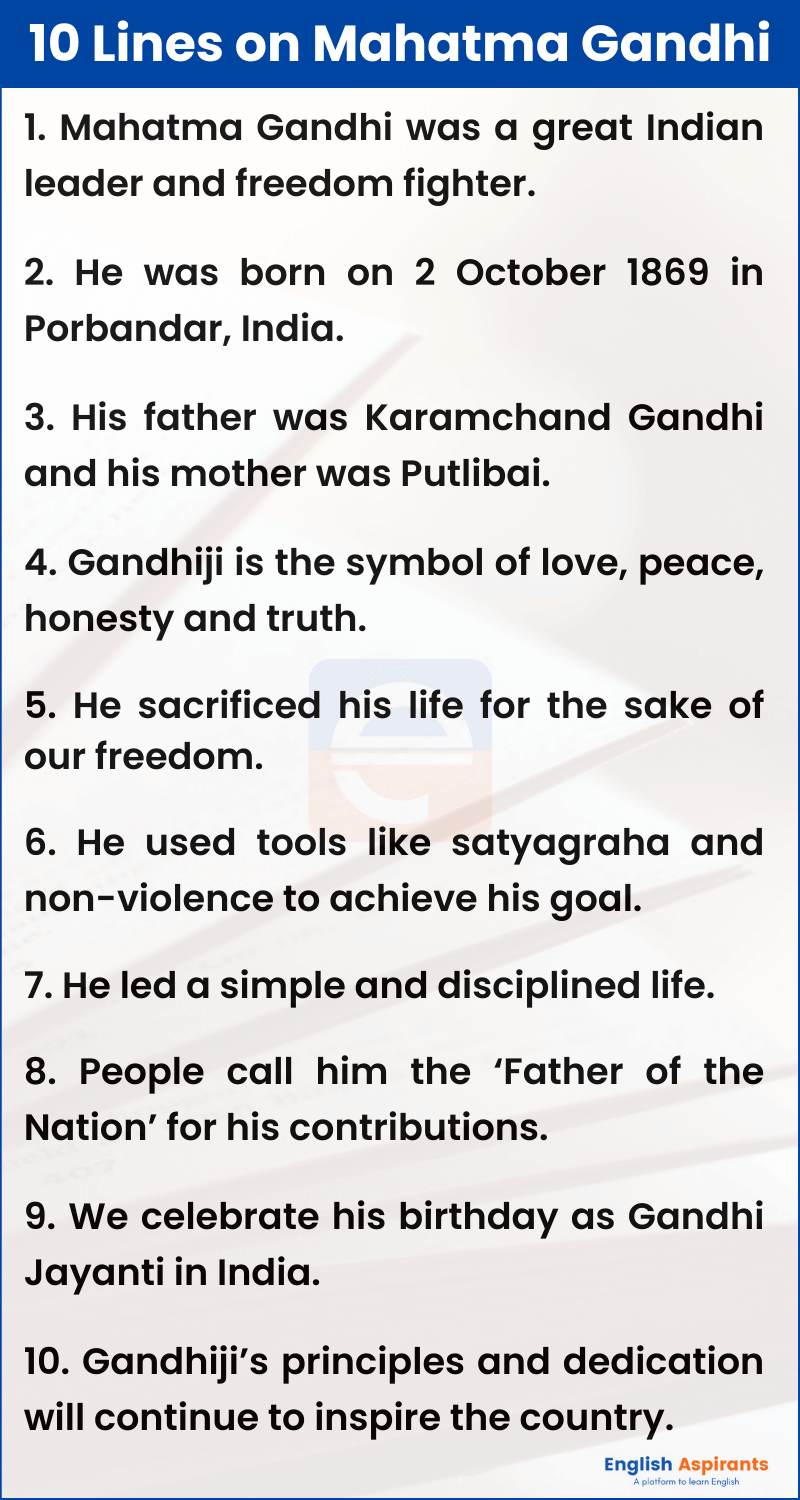
Mahatma Gandhi 10 lines: Set 3
1. Mahatma Gandhi played a great and unforgettable role in the Indian freedom struggle.
2. He was a peace-loving person and avoided any kind of violence.
3. His ideals were Satya (truth) and Ahimsa (non-violence).
4. He led the historic Dandi March to break the salt law.
5. He started the Quit India Movement in 1942 to end the British rule.
6. He struggled hard to overcome poverty and untouchability.
7. He tried to bring Hindus and Muslims together.
8. He was referred to as ‘Mahatma’ for his glorious works and achievements.
10. The birth anniversary of Mahatma Gandhi is celebrated as Gandhi Jayanti across India.
10. Gandhiji’s principles and ideologies will continue to inspire us in the future.
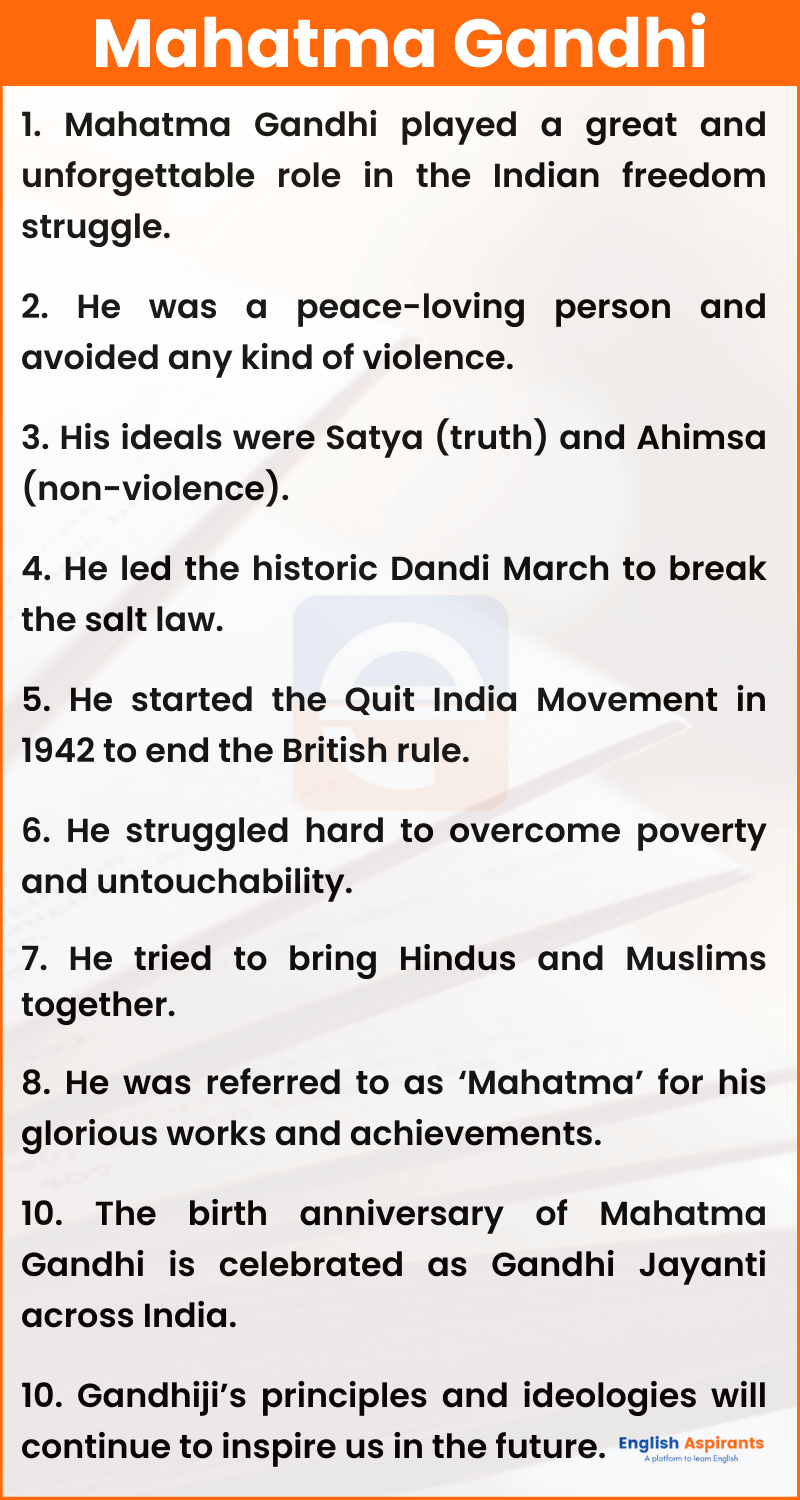
Also Read: Gandhi Jayanti Speech in English
10 Lines About Mahatma Gandhi: Set 4
1. Mahatma Gandhi was a great leader of the Indian freedom struggle.
2. He went to England to become a barrister. After that, he went to South Africa to practice law.
3. He used the ideals of truth and non-violence as his weapons in India’s freedom struggle.
4. Through movements like Non-cooperation Movent, Civil Disobedience Movement and Quit India Movement he fought for Indian freedom.
5. During Quit India Movement Mahatma Gandhi gave a ‘do or die’ call to the people of India and forced the British to leave India.
6. Gandhiji introduced the idea of Sarvodaya, which means ‘Universal Uplift’ or ‘Progress of All’.
7. He worked for the unity of the nation and removed untouchability.
8. Gandhiji wrote his autobiography titled ‘My experiments with Truth’ which covers his life up to 1920.
9. People lovingly called him ‘Bapu’ and the ‘Father of the Nation’.
10. Unfortunately, he was assassinated by Nathuram Godse on 30 January 1948.
Few Lines about Mahatma Gandhi: Set 5
1. Mohandas Karamchand Gandhi was a political and spiritual leader of India who led the country in the non-cooperation movement, Salt Satyagraha and Quit India movement.
2. He was born on 2 October 1869 in Porbandar, a town in Gujarat.
3. He was the youngest child of his parents, Karamchand Gandhi and Putlibai.
4. After passing matriculation, he went to England for further studies. Then he went to South Africa and started practising law.
5. Gandhiji returned to India in 1915 and became the leader of the Indian freedom struggle.
6. He adopted the principle of Truth and non-violence as weapons against British Rule in India.
7. He worked upliftment of Harijans. He founded Harijan Sevak Sangh to eradicate untouchability in India.
8. Greatly was greatly influenced by the writings of Leo Tolstoy, John Ruskin, etc.
9. For his contribution to Indian freedom, we all honour him by calling him the ‘Father of the Nation’ and ‘Bapu’.
10. Hind Swaraj, My Experiments with Truth, etc. are famous books written by Mahatma Gandhi.
Also Read: 10 Lines on Sarvepalli Radhakrishnan
5 Lines on Mahatma Gandhi in English
1. Mahatma Gandhi was a great Indian leader and social reformer.
2. He was born on 2nd October 1869 at Porbandar, Gujarat.
3. He fought very hard against the British for our freedom.
4. His main principles were Truth and Non-Violence.
5. He dedicated all his life to the service of our nation.
Frequently Asked Questions (FAQs)
Q1. what are the books written by mahatma gandhi.
The famous books of Gandhi are Hind Swaraj, Conquest of Self, My Experiments with Truth (An Autobiography), etc.
Q2. What are the famous movements led by Mahatma Gandhi?
Famous movements of Gandhiji – Champaran Satyagraha (1917), Khilafat Movement (1919), Civil Disobedience Movement (1930), Quit India Movement (1942).
Q3. Who was Gandhiji’s political Guru?
Gopal Krishna Gokhle was Gandhiji’s political guru.
Q4. How did Mahatma Gandhi Die?
Gandhi was shot by the Hindu fanatic Nathuram Godse on 30 January 1948.
Read More 10 Lines: 1. 10 Lines on Independence Day 2. 10 Lines on Rainy Season 3. 10 Lines on Teachers Day 4. 10 Lines on Our National Flag 5. 10 lines on My Vision for India in 2047
Related Posts
10 lines on myself | my self 10 lines for students and kids, my mother essay in english 10 lines [5 sets], holi essay in english 10 lines | 10 lines on holi festival, my vision for india in 2047 10 lines in english [2025 updated], 1 thought on “10 lines on mahatma gandhi in english [2025] – englishaspirants”.
Greetings! Very helpful advice on this article! It is the little changes that make the biggest changes. Thanks a lot for sharing!
Leave a Comment Cancel Reply
Your email address will not be published. Required fields are marked *
Save my name, email, and website in this browser for the next time I comment.
Essay Curve

Great Leader Mahatma Gandhi – Essay in 10 Lines, 100 to 1500 Words

Essay on Great Leader Mahatma Gandhi: Mahatma Gandhi, also known as the Father of the Nation in India, was a great leader who inspired millions with his philosophy of non-violent resistance. His teachings of truth, nonviolence, and civil disobedience played a crucial role in India’s struggle for independence from British rule. In this essay, we will explore the life and legacy of Mahatma Gandhi, his leadership qualities, and the impact he had on the world through his principles of peace and justice.
Table of Contents
Great Leader Mahatma Gandhi Essay Writing Tips
1. Introduction: – Start your essay by introducing Mahatma Gandhi, a great leader who played a significant role in India’s independence movement. – Mention his principles of non-violence, truth, and civil disobedience that inspired millions of people around the world.
2. Early Life and Education: – Provide a brief overview of Gandhi’s early life, including his upbringing in a middle-class family in India and his education in law in London. – Highlight how his experiences in South Africa, where he faced racial discrimination, shaped his beliefs and principles.
3. Role in India’s Independence Movement: – Discuss Gandhi’s pivotal role in leading the Indian independence movement against British colonial rule. – Explain how he used non-violent protests, such as the Salt March and Quit India Movement, to mobilize the masses and challenge British authority.
4. Influence on Civil Rights Movements: – Explore Gandhi’s influence on other civil rights movements around the world, including the American civil rights movement led by Martin Luther King Jr. – Discuss how his principles of non-violence and civil disobedience inspired leaders and activists to fight for justice and equality.
5. Legacy and Impact: – Reflect on Gandhi’s legacy as a great leader and advocate for social change. – Discuss how his teachings continue to inspire people to strive for peace, justice, and equality in today’s world.
6. Conclusion: – Summarize the key points of your essay and reiterate the significance of Mahatma Gandhi as a great leader. – Encourage readers to learn from Gandhi’s principles of non-violence and truth in their own lives and actions.
By following these writing tips and organizing your essay in a clear and structured manner, you can effectively convey the importance of Mahatma Gandhi as a great leader and his enduring impact on the world.
Essay on Great Leader Mahatma Gandhi in 10 Lines – Examples
1. Mahatma Gandhi was a prominent leader in the Indian independence movement against British colonial rule. 2. He was known for his philosophy of nonviolent resistance, which he called Satyagraha. 3. Gandhi led various campaigns for civil rights, social justice, and freedom in India. 4. He played a key role in the Salt March, a nonviolent protest against the British salt monopoly. 5. Gandhi was a strong advocate for the rights of the untouchables, or Dalits, in Indian society. 6. He promoted self-reliance and self-sufficiency through his philosophy of Swaraj, or self-rule. 7. Gandhi’s principles of nonviolence and civil disobedience inspired many other movements for social change around the world. 8. He was assassinated in 1948 by a Hindu nationalist who opposed his views on religious tolerance. 9. Gandhi’s legacy continues to inspire people to strive for justice, equality, and peace through nonviolent means. 10. He is often referred to as the “Father of the Nation” in India for his role in the country’s independence struggle.
Sample Essay on Great Leader Mahatma Gandhi in 100-180 Words
Mahatma Gandhi, also known as the Father of the Nation in India, was a great leader who led the country to independence from British rule through non-violent civil disobedience. His philosophy of Satyagraha, or truth force, inspired millions of people around the world to fight for justice and equality.
Gandhi’s leadership was characterized by his humility, simplicity, and unwavering commitment to his principles. He believed in the power of love and compassion to overcome hatred and violence. His dedication to non-violence and his ability to unite people from diverse backgrounds made him a truly exceptional leader.
Gandhi’s legacy continues to inspire people to strive for a better world through peaceful means. His teachings on non-violence, truth, and selflessness are as relevant today as they were during his lifetime. Mahatma Gandhi will always be remembered as a great leader who led by example and showed the world the power of peaceful resistance.
Short Essay on Great Leader Mahatma Gandhi in 200-500 Words
Mahatma Gandhi, also known as the Father of the Nation in India, was a great leader who played a significant role in India’s struggle for independence from British rule. His principles of non-violence, civil disobedience, and Satyagraha inspired millions of people around the world and continue to be relevant today.
Gandhi was born on October 2, 1869, in Porbandar, India. He studied law in England and practiced law in South Africa before returning to India to join the freedom struggle. Gandhi’s philosophy of non-violence, or Ahimsa, was deeply influenced by his Hindu beliefs and his study of other religions like Christianity and Islam. He believed that violence only begets more violence and that true change could only come through peaceful means.
One of Gandhi’s most famous campaigns was the Salt March in 1930, where he led thousands of Indians on a 240-mile march to the Arabian Sea to protest the British salt tax. The march was a powerful symbol of resistance and civil disobedience, and it drew international attention to the Indian independence movement.
Gandhi’s commitment to non-violence and his willingness to suffer for his beliefs inspired people all over the world. He was arrested multiple times, went on hunger strikes, and endured physical attacks, but he never wavered in his commitment to his principles. His ability to lead by example and his unwavering dedication to his cause earned him the respect and admiration of millions.
Gandhi’s influence extended far beyond India’s borders. He inspired civil rights leaders like Martin Luther King Jr. in the United States and Nelson Mandela in South Africa. His teachings on non-violence and peaceful resistance continue to be studied and practiced by activists and leaders around the world.
In addition to his political activism, Gandhi was also a social reformer who worked to improve the lives of the poor and marginalized in Indian society. He fought against the caste system, promoted education for all, and advocated for women’s rights. His vision of a just and equitable society where everyone is treated with dignity and respect continues to inspire people to work for social justice and equality.
Mahatma Gandhi’s legacy as a great leader and visionary continues to be celebrated and honored in India and around the world. His teachings on non-violence, civil disobedience, and social justice are as relevant today as they were during his lifetime. Gandhi’s life and work remind us of the power of love, compassion, and moral courage in the face of injustice and oppression. He truly was a great leader whose impact will be felt for generations to come.
Essay on Great Leader Mahatma Gandhi in 1000-1500 Words
Mahatma Gandhi, also known as Mohandas Karamchand Gandhi, was a great leader who played a significant role in India’s struggle for independence from British rule. He was born on October 2, 1869, in Porbandar, a coastal town in present-day Gujarat, India. Gandhi’s leadership style and philosophy of nonviolent resistance, known as Satyagraha, inspired millions of people around the world and continues to influence political movements to this day.
Gandhi’s early life was marked by a strong sense of duty and responsibility towards his family and community. He was deeply influenced by his mother, Putlibai, who instilled in him the values of compassion, honesty, and self-discipline. Gandhi’s father, Karamchand Gandhi, was the diwan, or chief minister, of Porbandar, and his upbringing was steeped in the traditions of Hinduism and Jainism.
Gandhi’s education was largely traditional, but he showed an early interest in social issues and justice. After completing his schooling in Porbandar and Rajkot, he went to England to study law at the Inner Temple in London. It was during his time in England that Gandhi was exposed to Western ideas and culture, which would later influence his thinking and approach to social and political change.
Upon his return to India in 1891, Gandhi struggled to establish a successful law practice in Bombay. However, his experiences of discrimination and injustice in South Africa would soon change the course of his life. In 1893, Gandhi was invited to South Africa to work on a legal case, and it was there that he witnessed firsthand the brutal realities of racial segregation and discrimination.
Gandhi’s experiences in South Africa were a turning point in his life. He became actively involved in the struggle for the rights of Indian immigrants in South Africa, leading campaigns of civil disobedience and nonviolent resistance against the oppressive policies of the British colonial government. It was during this time that Gandhi developed his philosophy of Satyagraha, or truth force, which emphasized the power of nonviolence and moral courage in the face of injustice.
Gandhi’s leadership in the Indian community in South Africa earned him the title of Mahatma, or “great soul,” from his followers. He returned to India in 1915, where he quickly became a prominent figure in the Indian National Congress, the leading political party in the country at the time. Gandhi’s message of nonviolent resistance and civil disobedience resonated with millions of Indians who were tired of British colonial rule and yearned for independence.
Gandhi’s leadership during India’s struggle for independence was marked by his unwavering commitment to nonviolence and his willingness to sacrifice his own freedom and comfort for the greater good. He led numerous campaigns of civil disobedience, including the famous Salt March in 1930, where he and his followers walked 240 miles to the Arabian Sea to protest the British monopoly on salt production.
Gandhi’s philosophy of nonviolence was not just a political strategy, but a deeply held belief in the power of love and compassion to overcome hatred and injustice. He believed that true change could only come from within, and that individuals had a moral duty to resist oppression and injustice through peaceful means.
Gandhi’s leadership style was characterized by his humility, simplicity, and selflessness. He lived a frugal and austere life, wearing simple clothes and eating a vegetarian diet. He believed in leading by example, and his personal integrity and moral courage inspired others to follow his lead.
Gandhi’s influence extended far beyond India’s borders. His philosophy of nonviolence inspired civil rights leaders such as Martin Luther King Jr. in the United States and Nelson Mandela in South Africa. Gandhi’s message of peace and reconciliation continues to resonate with people around the world who are fighting for justice and equality.
Gandhi’s leadership was not without its critics. Some accused him of being too idealistic and naive in his approach to social and political change. Others questioned his commitment to the rights of marginalized groups, such as women and Dalits, or untouchables, in Indian society.
Despite these criticisms, Gandhi’s legacy as a great leader and visionary thinker remains intact. His philosophy of nonviolence and his commitment to social justice continue to inspire generations of activists and leaders who are working to create a more just and peaceful world.
In conclusion, Mahatma Gandhi was a great leader whose legacy continues to inspire people around the world. His philosophy of nonviolence and his commitment to social justice have left an indelible mark on the history of India and the world. Gandhi’s leadership style, characterized by humility, simplicity, and selflessness, serves as a model for future generations of leaders who seek to create positive change in their communities and beyond. Gandhi’s message of love and compassion remains as relevant today as it was during his lifetime, and his example continues to inspire those who are working for a more just and peaceful world.
Related Essays
Essay on A Visit To A Fair – 10 Lines, 100 to 1500 Words
Value of Games And Sports – Essay in 10 Lines, 100 to 1500 Words
Essay on Importance of Teacher – 100, 200, 500, 1000 Words
Essay on A Visit To A Museum – 100, 200, 500, 1000 Words
Essay on Effect of Social Media On Youth
Essay on Shri Guru Nanak Dev Ji – Short & Long Essay Examples
Essay on Nuclear Family – Short Essay & Long Essay upto 1500 Words
Essay on Anudeep Durishetty – 10 Lines, 100 to 1500 Words
Essay on Non Violence – Samples, 10 Lines to 1500 Words
Covid 19 Responsive School – Essay in 10 Lines, 100 to 1500 Words
Leave a Comment Cancel reply
Save my name, email, and website in this browser for the next time I comment.
Quick reads to give you information on multiple topics.
Short Essay And 10 Lines on Mahatma Gandhi
Discover the inspiring life of Mahatma Gandhi in this essay. Learn about his impactful contributions and timeless legacy in just 10 lines!
Mahatma Gandhi: The Father of Our Nation
Mahatma Gandhi is the Father of our Nation. You must have read about him in your books and heard about him from your elders. Did you know what his full name was? His full name was Mohandas Karamchand Gandhi. He was born in a village in Gujarat and grew up to become a great leader who freed the country from the Britishers. He is respected and admired by people all across the world. Let us learn to write short essays on Mahatma Gandhi .
Short Essay on Mahatma Gandhi
Mohandas Karamchand Gandhi who is lovingly called Mahatma Gandhi, was a great leader. He was an important figure in India’s independence movement. He was born on 2nd October 1869 in Porbandar, Gujarat. His father’s name was Karamchand Gandhi and his mother’s name was Putlibai. He married Kasturba Gandhi at the young age of 13. Mahatma Gandhi studied in London and was a qualified barrister. When he came back to India after finishing his studies and years of work, he was saddened by the conditions of Indians under British rule.
He decided to overthrow the British and make India independent. He started many movements, like the non-cooperation movement and civil disobedience movement, that shook the British rulers. Mahatma Gandhi was a follower of ahimsa or the principle of non-violence. He believed in peace and togetherness of all Indians. He led a simple life where he lived in his ashram and dressed himself in simple loincloths. He promoted simplicity, humility and truthfulness. He was very fond of spinning the wheel, or charkha. He urged all Indians to spin the charkha and become self-sufficient. He used to live and work in the Sabarmati Ashram. Even today people visit the ashram to learn about his ideas.
Due to his great contributions to India’s independence and valuable teachings, he is regarded as the Father of the Nation in India. All Indians fondly remember him as Bapu and celebrate his birth anniversary as Gandhi Jayanti and Non Violence Day . Mahatma Gandhi died on 30th January 1948. His last words were “ Hey Ram” . After his death, the memorial of Raj Ghat was built on the site of his cremation. His last words are inscribed on this memorial. People visit the memorial and pay tribute to the Father of the Nation.
If you need to write 10 lines on Mahatma Gandhi, you can take them from the Essay. Here you go –
- Mohandas Karamchand Gandhi, widely known as Mahatma Gandhi was a great leader of our country.
- He was born on 2nd October 1869 in Porbandar, Gujarat.
- His father’s name was Karamchand Gandhi and his mother’s name was Putlibai. He married Kasturba Gandhi at the age of 13.
- He studied in London and became a qualified barrister.
- He returned to India and was deeply moved by the plight of Indians under British rule.
- Mahatma Gandhi started movements like non-cooperation movement and civil disobedience movement to challenge British rule.
- Mahatma Gandhi believed in ahimsa or non-violence and the principles of togetherness, and truthfulness.
- He lived a simple life and promoted a simple lifestyle. The Sabarmati Ashram served as his residence and workplace.
- He is dearly called the Father of the Nation in India.
- He died on 30 January 1948, with his last words being “Hey Ram.” The Raj Ghat memorial was built in his honour.
Ten Important Teachings of Mahatma Gandhi
1. Principles of Nonviolence: Mahatma Gandhi was a firm believer of nonviolence, or “ahimsa”.
2. Truth and Integrity: He believed in truthfulness and integrity, and inspired everyone to be honest.
3. Kindness to all living beings: Mahatma Gandhi taught everyone to be kind to each other and also to the animals around us.
4. Self-Discipline: Mahatma Gandhi was a very disciplined man. He believed that discipline is the first step in achieving success.
5. Simple Living: He inspired people to reduce their material needs and live a simple life.
6. Importance of Education: He believed in education for all and saw it as a means to empower people.
7. Equality: He fought against discrimination and promoted equality.
8. Self-Reliance: Mahatma Gandhi believed that we should work to meet our needs independently.
9. Satyagraha – Mahatma Gandhi believed in the concept of “Satyagraha”. He insisted that we should be truthful in our fight against injustice.
10. Service to Others: Gandhi believed in the principle of “Seva” or service to others, emphasising the importance of helping those in need.
FAQs about Mahatma Gandhi:
1. What was the real name of Mahatma Gandhi?
Ans. Mahatma Gandhi’s real name was Mohandas Karamchand Gandhi.
2. What are some important books written by Mahatma Gandhi?
Ans. Some important books written by Mahatma Gandhi are Hind Swaraj , The Story of My Experiments with Truth and All Men are Brothers .
3. Which newspapers were started by Mahatma Gandhi?
Ans. Mahatma Gandhi started the Indian Opinion, Young India, Navajivan and Harijan newspapers.
4. Where was Mahatma Gandhi born?
Ans. Mahatma Gandhi was born in Porbandar, Gujarat.
5. When did Mahatma Gandhi die?
Ans. Mahatma Gandhi died on 30 January 1948.
6. Where was Mahatma Gandhi born?
Ans. Mahatma Gandhi was born on 2nd October 1869.
7. Who gave the title of “Father of the Nation” to Mahatma Gandhi?
Ans. The title “Father of the Nation” was first used by Subhash Chandra Bose for Mahatma Gandhi.
10 Lines And Short Essay on National Youth Day
10 Lines On My Best Friend With Short Essay
Essay And 10 Lines on Children’s Day
By Ratna Sagar
Related post, short essay and 10 lines on national pollution control day, short essay and 10 lines on dr. verghese kurien, short essay and 10 lines on the constitution day of india, short essay and 10 lines on guru nanak jayanti.

10 Lines on Mahatma Gandhi in English for Students

Table of Contents
When writing about a famous person, the focus should be on their struggles, sacrifices, successes, achievements, and the messages they gave to society. So, if a child wants to write an essay on someone like Mahatma Gandhi, they should learn more about his life and how to describe it in simple words.
Fill Out the Form for Expert Academic Guidance!
Verify OTP Code (required)
I agree to the terms and conditions and privacy policy .
Fill complete details
Target Exam ---
This essay about Mahatma Gandhi will help them gain knowledge about this important figure, someone they can look up to for inspiration. It will also help them write an amazing essay on this interesting topic. So, let’s begin and learn more about this great leader!
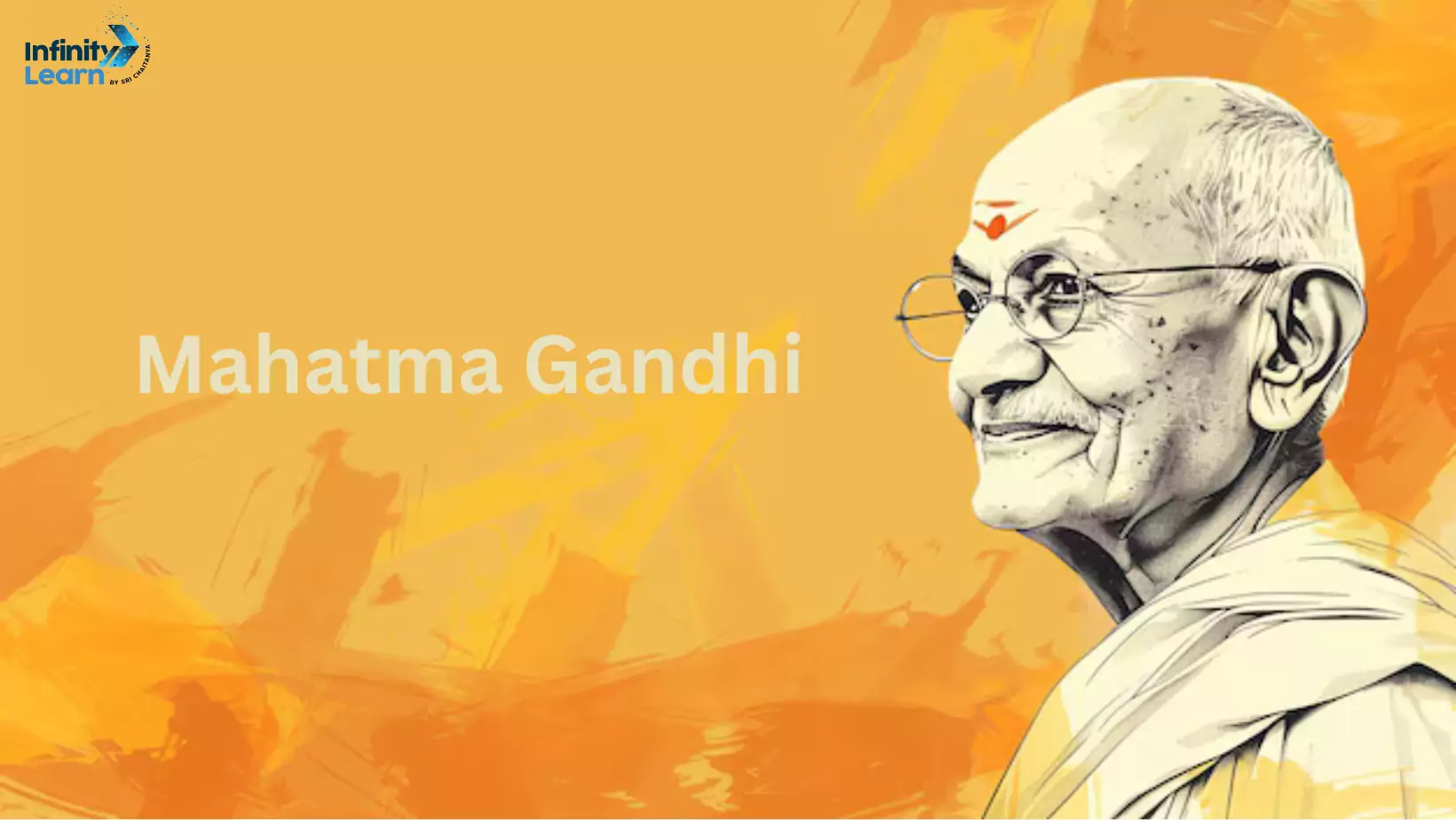
Top 10 Lines on Mahatma Gandhi in English

- Mahatma Gandhi, also known as the Father of the Nation , was a great leader who fought for India’s freedom.
- He believed in non-violence and led peaceful protests to achieve independence from British rule.
- Gandhi taught us the importance of truth and simplicity in life.
- He led famous movements like the Dandi March and the Quit India Movement .
- Mahatma Gandhi’s ideas of peace, love, and unity continue to inspire people all over the world.
- His birthday, October 2 , is celebrated as Gandhi Jayanti every year to honor his contributions.
- Gandhi’s famous saying, “Be the change you wish to see in the world,” encourages us to make a positive difference in society.
- He worked not only for India’s freedom but also for social reforms like fighting against untouchability and promoting women’s rights .
- Through his life, Gandhi showed us that courage and patience can bring about great changes.
- Today, we remember Mahatma Gandhi as a symbol of peace and justice for all.
15 lines about Mahatma Gandhi in English
- Mahatma Gandhi was born on October 2, 1869, in Porbandar, India.
- His full name was Mohandas Karamchand Gandhi.
- He is known as the Father of the Nation in India.
- Gandhi led India’s struggle for independence from British rule.
- He believed in non-violence (ahimsa) and truth (satya).
- His famous movements include the Salt March and Quit India Movement.
- Gandhi practiced simplicity and wore a simple cloth called a dhoti.
- He inspired people all over the world with his peaceful methods.
- He encouraged people to boycott British goods and services.
- Gandhi fought for the rights of the poor and the untouchables.
- His principles of non-violence influenced global leaders like Martin Luther King Jr.
- Gandhi’s efforts helped India gain independence on August 15, 1947.
- He believed in unity and equality among all religions and people.
- Gandhi was assassinated on January 30, 1948.
- His teachings of peace, truth, and non-violence are remembered worldwide.

Mahatma Gandhi Essay 10 Lines
- He is known as the “Father of the Nation” in India.
- Gandhi believed in truth, non-violence, and peaceful protest.
- His method of non-violence was called Ahimsa .
- He led many important movements like the Dandi Salt March and Quit India Movement.
- Gandhi fought for India’s independence from British rule.
- He inspired millions of people with his values of equality and justice.
- Gandhi’s simple lifestyle and strong principles made him a global leader.
- His birthday, October 2, is celebrated as Gandhi Jayanti and as the International Day of Non-Violence.
- Mahatma Gandhi’s teachings continue to inspire people around the world today.
20 lines about Mahatma Gandhi
- Gandhi believed in non-violence and truth.
- He fought for India’s freedom from British rule.
- He led many peaceful protests, such as the Salt March.
- His method of protest was called “Satyagraha,” which means non-violent resistance.
- Gandhi inspired people to use peaceful means to fight injustice.
- He also worked to remove untouchability from Indian society.
- He wore simple clothes made of khadi, a handwoven cloth.
- Gandhi promoted the idea of self-reliance and rural development.
- He believed in living a simple life and serving others.
- Gandhi encouraged people to live in harmony and unity.
- He worked to improve relations between Hindus and Muslims.
- His famous quote is, “Be the change you wish to see in the world.”
- Gandhi’s ideas influenced many leaders around the world.
- He was jailed several times for protesting peacefully.
- His birthday, October 2, is celebrated as Gandhi Jayanti in India.
- Mahatma Gandhi’s life and teachings continue to inspire people globally.
Mahatma Gandhi FAQs
What are 10 facts about gandhi.
Gandhi was born on October 2, 1869, in India. He led India’s freedom struggle using non-violent methods.
Mahatma Gandhi, known as the 'Father of the Nation,' was a leader in India's fight for independence from British rule.
Gandhi is a key figure in history for his role in promoting peace and non-violence during India's struggle for freedom.
Mahatma Gandhi was born in 1869. He studied law in England and practiced in South Africa, where he developed his ideas of non-violence.
Gandhi believed in non-violence, truth, and self-discipline. He encouraged people to be self-reliant and peaceful.
Gandhi's last words were 'Hey Ram,' which means 'Oh God,' as he was shot.
Mahatma Gandhi was hit by three bullets when he was assassinated on January 30, 1948.
Gandhiji died on January 30, 1948, in New Delhi, India.
Gandhi was assassinated at Birla House in New Delhi.
The last place Gandhi visited was the garden at Birla House, just before he was shot.
Related content

Get access to free Mock Test and Master Class
Register to Get Free Mock Test and Study Material
Offer Ends in 5:00
Select your Course
Please select class.

studyhelpinghand
Your Door To Be An Excellent Learner
Mahatma Gandhi 10 Lines In English
Check Mahatma Gandhi 10 Lines In English for Class 1, 2, 3, 4, 5, 6, 7, 8, 9, 10. Mahatma Gandhi, also known as Bapu (Father), was a remarkable leader and a national hero of India. He was born on October 2, 1869, in a small town called Porbandar in Gujarat.
Table of Contents
We’ll be discussing Mahatma Gandhi 10 Lines In English. Also, we will have a look at the essay on Mahatma Gandhi in English (paragraph on Mahatma Gandhi in English). Let’s check them one by one.
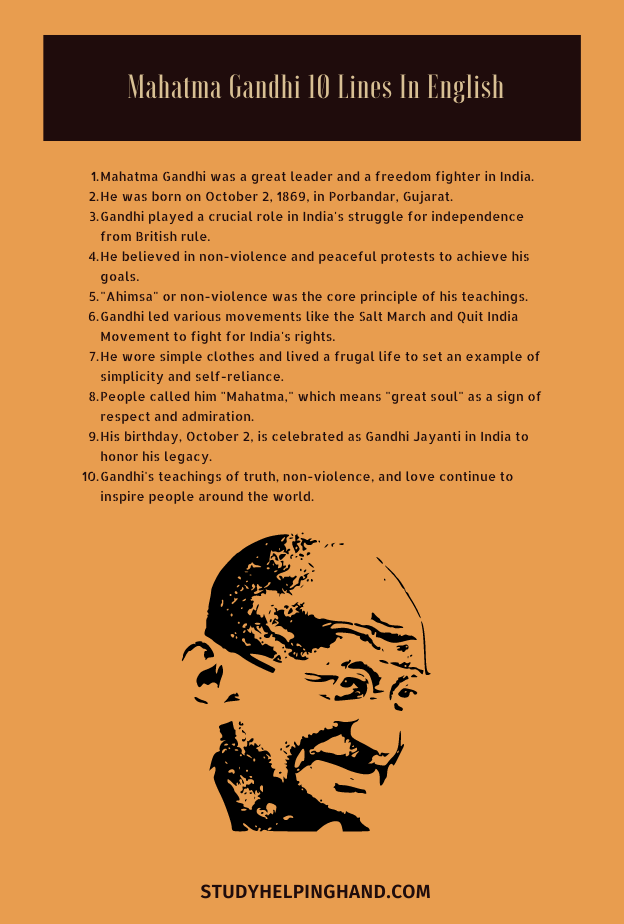
- Mahatma Gandhi was a great leader and a freedom fighter in India.
- He was born on October 2, 1869, in Porbandar, Gujarat.
- Gandhi played a crucial role in India’s struggle for independence from British rule.
- He believed in non-violence and peaceful protests to achieve his goals.
- “Ahimsa” or non-violence was the core principle of his teachings.
- Gandhi led various movements like the Salt March and Quit India Movement to fight for India’s rights.
- He wore simple clothes and lived a frugal life to set an example of simplicity and self-reliance.
- People called him “Mahatma,” which means “great soul” as a sign of respect and admiration.
- His birthday, October 2, is celebrated as Gandhi Jayanti in India to honor his legacy.
- Gandhi’s teachings of truth, non-violence, and love continue to inspire people around the world.
Essay On Mahatma Gandhi In English
Paragraph on mahatma gandhi in english.
Mahatma Gandhi, also known as Bapu (Father), was a remarkable leader and a national hero of India. He was born on October 2, 1869, in a small town called Porbandar in Gujarat. Gandhi played a vital role in India’s struggle for freedom from British rule. He was a man of great wisdom, kindness, and determination, and his teachings have left a lasting impact on the world.
As a child, Gandhi was honest, obedient, and compassionate. He loved reading books and learning about the world around him. He was a diligent student and completed his studies in law from a university in London.
After finishing his studies, Gandhi returned to India and witnessed the suffering of his fellow countrymen under British rule. He was deeply moved and decided to fight for India’s freedom. However, unlike others who used violence, Gandhi chose a different path – the path of non-violence or “Ahimsa.” He believed that problems could be solved through peace, love, and understanding.
Gandhi led various movements and campaigns to protest against unjust laws and policies of the British government. One of his most significant movements was the Salt March, where he walked over 240 miles to make his own salt and defy British salt taxes. His peaceful protests inspired millions of people to join the freedom struggle.
Gandhi was known for his simple lifestyle. He dressed in traditional Indian clothes and lived in a humble ashram with his followers. He believed in self-reliance and encouraged people to spin their own clothes using the spinning wheel or “charkha” to promote Indian textiles and self-sufficiency.
Gandhi was a champion of equality and believed that everyone should be treated with respect, regardless of their background or caste. He fought against discrimination and untouchability, working to build a more harmonious society.
Mahatma Gandhi’s teachings of truth, non-violence, and love continue to inspire people all around the world. His principles of peace and unity are followed by many leaders, and his birthday, October 2, is celebrated as Gandhi Jayanti to honor his legacy.
Mahatma Gandhi was a truly exceptional leader who led India to freedom through his principles of truth, non-violence, and love. He was a man of integrity, simplicity, and compassion, and his life’s work serves as a shining example for us all. Let us remember and cherish his teachings and strive to make the world a better place, just like the great soul of India – Mahatma Gandhi.
Hope you learned about Mahatma Gandhi 10 Lines In English.
Shivansh Shukla
You might also like, 10 lines on mango for nursery class in english, 10 lines on durga puja in english, parrot essay 10 lines in english, leave a reply cancel reply.
Your email address will not be published. Required fields are marked *
Save my name, email, and website in this browser for the next time I comment.
10 Lines on “Mahatma Gandhi” complete Essay, Biography for class 9, 10, 12 examination.
Biography of “mahatma gandhi”.
1. India has produced many outstanding personalities who have left behind a legacy of greatness, noble life and sublime ideals. Among these men, Mahatma Gandhi stands in the forefront.
2. Today he is considered as the greatest, the noblest and the finest Indian ever born in our land. He was the brightest star ever raised on the horizon of India.
3. Mahatma Gandhi was born on Oct. 2, 1869, at Porbandar, in Gujarat, in a noble Hindu family. His full name is Mohandas Karamchand Gandhi. After passing his matriculation examination, he was sent to England to study law. In 1890, he returned from England as a lawyer. 4. Soon after his arrival in India, he was called to help the Indians who were facing numerous hardships under the British rule in South Africa.
5. Gandhi started the Satyagraha movement against the unjust treatment meted out to the Indians there by the British. As a result of his great efforts the British were forced to give more freedom to the Indians residing there.
6. In 1914, Mahatma Gandhi returned to India and immediately put himself in the forefront of the freedom struggle movement that had just begun. Within a few years, he became the undisputed leader of the national movement for freedom.
7. In order to free India from the foreign yoke, Gandhiji started three mass movements, namely the Non-cooperation movement in 1920, the Civil Disobedience movement in 1930 and the Quit India movement in 1942.
8. These three movements shook the very foundation of British rule in India and brought millions of Indians into the freedom struggle movement.
9. Gandhiji advocated non-violence and Satyagraha as his chief weapons to achieve freedom. Many times he was arrested and put jail. But nothing could deter his quest for national freedom.
10. The British realized that they could no longer stay in India and was forced to grant independence to our country on Aug. 15, 1947. Mahatma Gandhi was assassinated on 30th January 1948 by Nathuram Godse.
Related Posts

Absolute-Study
Hindi Essay, English Essay, Punjabi Essay, Biography, General Knowledge, Ielts Essay, Social Issues Essay, Letter Writing in Hindi, English and Punjabi, Moral Stories in Hindi, English and Punjabi.
Save my name, email, and website in this browser for the next time I comment.

IMAGES
COMMENTS
1) Mahatma Gandhi was the leader of the Indian Independence Movement against British rule. 2) He inspired civil rights and freedom movements across the world. 3) The title “Mahatma” was given to him in South Africa in 1914.
Oct 1, 2024 · The Life of Mahatma Gandhi – An Essay Writing Approach. As Gandhi Jayanti approaches, students anticipate yet another essay on the great philosopher and leader Mahatma Gandhi in school boards nationwide. However, writing biographical essays can be confusing, especially as learners are sometimes afraid of missing crucial events in the life of ...
Also Read: Essay on Mahatma Gandhi. Mahatma Gandhi Essay in English 10 lines: Set 2. 1. Mahatma Gandhi was a great Indian leader and freedom fighter. 2. He was born on 2 October 1869 in Porbandar, India. 3. His father was Karamchand Gandhi and his mother was Putlibai. 4. Gandhiji is the symbol of love, peace, honesty and truth. 5.
Mar 19, 2024 · Sample Essay on Great Leader Mahatma Gandhi in 100-180 Words. Mahatma Gandhi, also known as the Father of the Nation in India, was a great leader who led the country to independence from British rule through non-violent civil disobedience.
Jan 5, 2024 · If you need to write 10 lines on Mahatma Gandhi, you can take them from the Essay. Here you go – Mohandas Karamchand Gandhi, widely known as Mahatma Gandhi was a great leader of our country. He was born on 2nd October 1869 in Porbandar, Gujarat. His father’s name was Karamchand Gandhi and his mother’s name was Putlibai.
Mahatma Gandhi Essay 10 Lines. Mahatma Gandhi was born on October 2, 1869, in Porbandar, India. He is known as the “Father of the Nation” in India. Gandhi believed in truth, non-violence, and peaceful protest. His method of non-violence was called Ahimsa. He led many important movements like the Dandi Salt March and Quit India Movement.
Dec 10, 2023 · Mahatma Gandhi Essay in English 10 Lines SET 4. 1- Mahatma Gandhi was a great freedom fighter. 2- Who had liberated our country from the British. 3- Gandhiji was born on 2 October 1869 in Porbandar. 4- Porbandar is located in Gujarat. 5- The full name of Mahatma Gandhi was Mohandas Karamchand Gandhi. 6- Gandhiji was also known by the name of Bapu.
Jul 21, 2023 · Mahatma Gandhi was a great leader and a freedom fighter in India. He was born on October 2, 1869, in Porbandar, Gujarat. Gandhi played a crucial role in India’s struggle for independence from British rule.
Mar 23, 2023 · 10 Lines on “Mahatma Gandhi” complete Essay, Biography for class 9, 10, 12 examination. Absolute-Study March 23, 2023 Uncategorized No Comments Biography of “Mahatma Gandhi”
Jun 20, 2020 · But Gandhi remained an undisputed leader of the masses. His moral courage and his godliness rightly gave him the title of ‘Mahatma’ and he shall ever be remembered as the greatest leaders of the 20th century. 10 Lines on Great Leader. When we think of a great leader, one thinks of Mahatma Gandhi.